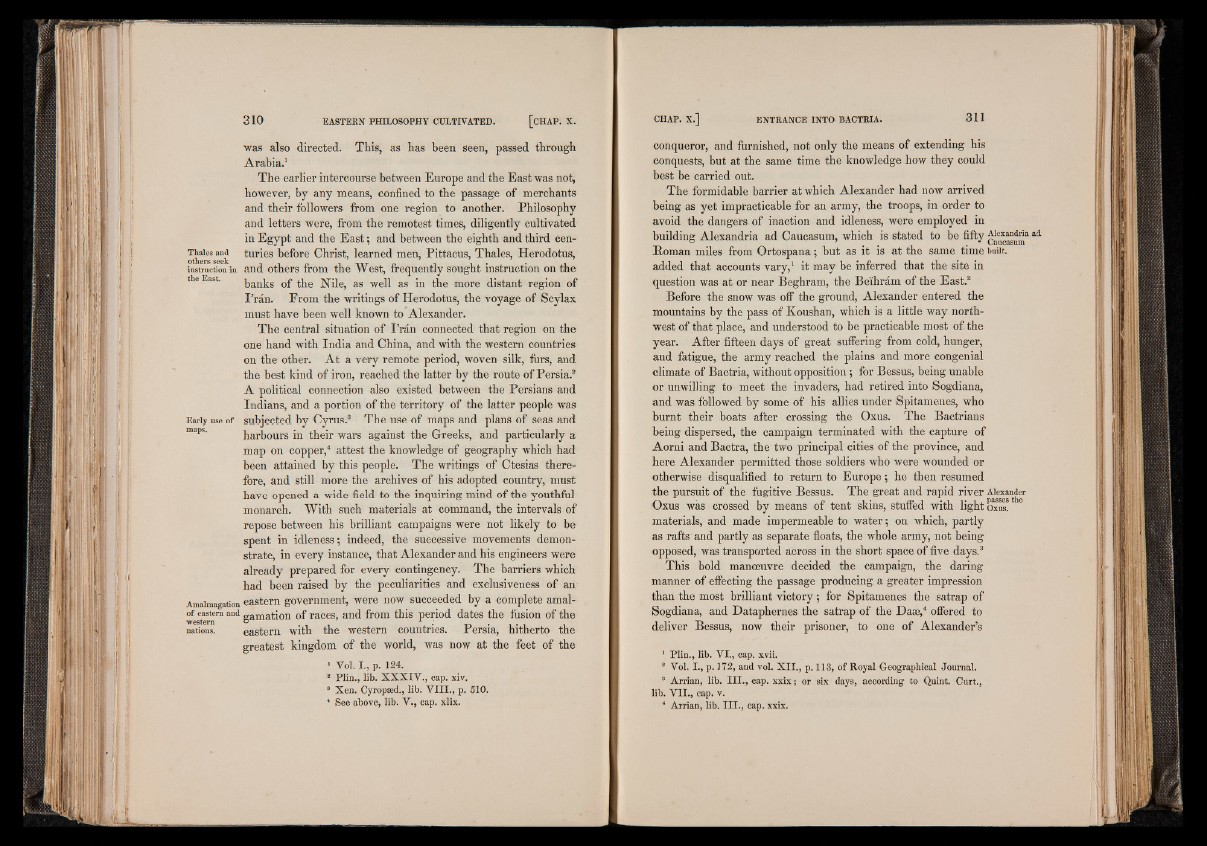
Thales and
others seek
instruction in
the East.
Early use of
maps.
Amalmagation
of eastern and
■western
nations.
was also directed. This, as has been seen, passed through
Arabia.1
The earlier intercourse between Europe and the East was not,
however, by any means, confined to the passage of merchants
and their followers from one region to another. Philosophy
and letters were, from the remotest times, diligently cultivated
in Egypt and the East; and between the eighth and third centuries
before Christ, learned men, Pittacus, Thales, Herodotus,
and others from the West, frequently sought instruction on the
banks of the Nile, as well as in the more distant region of
I ’ran. From the writings of Herodotus, the voyage of Scylax
must have been well known to Alexander.
The central situation of I ’ran connected that region on the
one hand with India and China, and with the western countries
on the other. At a very remote period, woven silk, furs, and
the best kind of iron, reached the latter by the route of Persia.2
A political connection also existed between the Persians and
Indians, and a portion of the territory of the latter people was
subjected by Cyrus.3 The use of maps and plans of seas and
harbours in their wars against the Greeks, and particularly a
map on copper,4 attest the knowledge of geography which had
been attained by this people. The writings of Ctesias therefore,
and still more the archives of his adopted country, must
have opened a wide field to the inquiring mind of the youthful
monarch. With such materials at command, the intervals of
repose between his brilliant campaigns were not likely to be
spent in idleness; indeed, the successive movements demonstrate,
in every instance, that Alexander and his engineers were
already prepared for every contingency. The barriers which
had been raised by the peculiarities and exclusiveness of an
eastern government, were now succeeded by a complete amalgamation
of races, and from this period dates the fusion of the
eastern with the western countries. Persia, hitherto the
greatest kingdom of the world, was now at the feet of the
1 Vol. I ., p. 124.
s Plin., lib. X X X IV ., cap. xiv.
8 Xen. Cyropsed., lib. V I I I ., p. 510.
4 See above, lib. V., cap. xlix.
conqueror, and furnished, not only the means of extending his
conquests, but at the same time the knowledge how they could
best be carried out.
The formidable barrier at which Alexander had now arrived
being as yet impracticable for an army, the troops, in order to
avoid the dangers of inaction and idleness, were employed in
building Alexandria ad Caucasum, which is stated to be fifty V, a4
Roman miles from Ortospana; but as it is at the same time built,
added that accounts vary,1 it may be inferred that the site in
question was at or near Beghram, the Be'ihrám of the East.2
Before the snow was off the ground, Alexander entered the
mountains by the pass of Koushan, which is a little way northwest
of that place, and understood to be practicable most of the
year. After fifteen days of great suffering from cold, hunger,
and fatigue, the army reached the plains and more congenial
climate of Bactria, without opposition; for Bessus, being unable
or unwilling to meet the invaders, had retired into Sogdiana,
and was followed by some of his allies under Spitamenes, who
burnt their boats after crossing the Oxus. The Bactrians
being dispersed, the campaign terminated with the capture of
Aorni and Bactra, the two principal cities of the province, and
here Alexander permitted those soldiers who were wounded or
otherwise disqualified to return to Europe; he then resumed
the pursuit of the fugitive Bessus. The great and rapid river Alexander
Oxus was crossed by means of tent skins, stuffed with light oxus! 6
materials, and made impermeable to water; on which, partly
as rafts and partly as separate floats, the whole army, not being
opposed, was transported across in the short space of five days.3
This bold manoeuvre decided the campaign, the daring
manner of effecting the passage producing a greater impression
than the most brilliant victory; for Spitamenes the satrap of
Sogdiana, and Dataphernes the satrap of the Daae,4 offered to
deliver Bessus, now their prisoner, to one of Alexander’s
1 Plin., lib. VI., cap. xvii.
2 Vol. I., p. 172, and vol. X I I ., p. 113, of Royal Geographical Journal.
3 Arrian, lib. I I I . , cap. x x ix ; or six days, according to Quint. Curt.,
lib. V I I ., cap. v.
4 Arrian, lib. I I I . , cap. xxix.